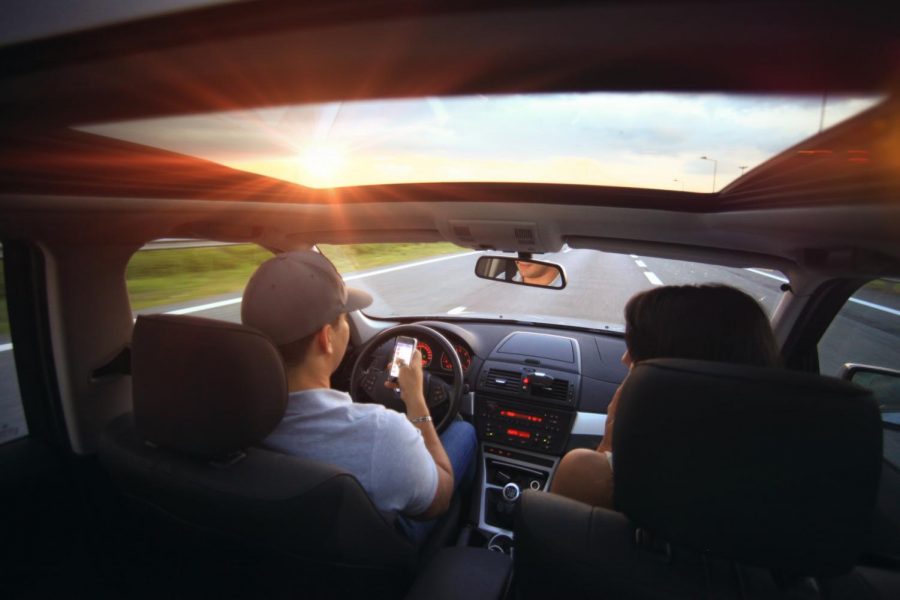Poma: Utah Can’t Tolerate Distracted Driving
February 28, 2021
One recent morning, I woke up early to meet with a friend. I got in my car and made the same maneuvers I’d done countless times before — backed out of my garage, switched gears, and turned the corner. Light snow fell the night before, so my car felt colder than usual, and I briefly glanced down to turn on the heater. The next thing I knew, I’d rammed into the sidewalk just outside my house. I wasn’t hurt. My front tire, however, was not so lucky.
Distracted driving comes in many forms, and no one is immune to the consequences. If people get distracted by seemingly quick tasks like turning on the heater, it’s a wonder as to how people use their cell phones while driving. Many states have banned the use of any handheld device to reduce accidents caused by distracted driving. Utah, unfortunately, has yet to take that step. Rep. Carol Spackman Moss is sponsoring H.B. 160, which if passed, would make driving while operating any handheld device a criminal offense. Although it seems harsh, this is one of the sure-fire ways to see fewer distraction-related accidents on Utah’s roads.
I covered the Distracted Driving Amendments last year and was surprised that the motion was denied, considering the safety measures it would provide. H.B. 160, in its original form, states that the operation of a handheld wireless device could result in a misdemeanor and a fine of $100 maximum. The only exceptions are to use a hands-free option, dial for an emergency, or if one’s job requires the use of a handheld device. Right now, Utah only allows officers to fine someone for using a cell phone while driving if an accident has already occurred, but H.B. 160 would allow officers to pull someone over to give them a citation before there’s an accident.
Some may feel that it’s redundant to have a ban on all handheld communication when Utah already banned texting while driving. But that has not been enough to curb the accidents that are attributed to distracted driving. On average, 5,187 accidents occur yearly in Utah from distracted drivers alone, which is just over 9% of all our accidents. Rep. Moss noted in an interview with St. George News that the problem is “getting worse, not better, citing that drivers not only continue to text and drive without the handless feature, they are also using FaceTime and even attending Zoom meetings while driving.”
Critics of this bill also argue that other distractions occur while someone is driving, such as tending to children or changing the radio station (or turning on your heater). Other states have chosen to take the high road and understand the need for people to be issued citations on cell phone use. For example, Arizona recently adopted a policy similar to the one H.B. 160 proposes. Starting January 2021, officers were permitted to issue fines — not just warnings — to people caught using handheld devices. It was obvious to the Arizona chapter of the National Safety Council that distracted driving could not go unnoticed in the state. They cited that 810 deaths occurred on Arizona roads in 2018 because of distracted driving. They saw their state’s driving statistics, understood the problem and addressed it properly.
If you think that’s harsh,Oregon has the strictest consequences in the nation for distracted driving. Drivers receive a $1,000 fine for the first offense. After a year this policy was enacted, the citations in Oregon actually spiked, which showed drivers that there are tangible repercussions for choosing to drive while using their device. People can tell their friends, who tell others, which causes everyone to think twice before they use handheld devices behind the wheel.
And those two states aren’t the only ones to enact more stringent laws regarding distracted driving. Forty-eight states have banned texting while driving alone. Utah is one of those states, but it’s clear from statistics that isn’t enough. We’re seeing more states be aware that distraction comes in other forms aside from texting – any sort of handheld operation is a risk to public safety.
As such, legislators should consider joining those that have enacted these laws. We have yet to see substantial decreases in states that have enacted such laws, according to this 2014 study. However, it would be better to stop the problem now before statistics continue to rise. Utah roads become busier every year because of how fast our population is growing. Construction occurs year-round and seemingly never ends. Our roads cannot support hundreds of drivers continuing to use handheld devices. We have an opportunity to make roads safer for Utahns, and it starts by simply putting our phones on speaker or not using them at all.
Considering that lives are at stake, legislators should not ignore the benefits that could come from H.B. 160. This bill is not being pushed yearly without a good reason — Utah needs its residents to be more mindful of their driving behaviors now more than ever. If only one person is saved because they or someone else chose not to use a cell phone while driving, then that makes all the difference.








